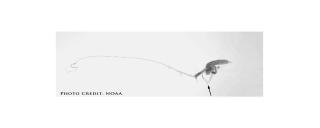Fact Sheet
| Scientific Name |
(Cercopagis pengoi) |
| Classification and Permitting Level |
1 - Prohibited Aquatic Nuisance Species |
| Species Description |
The fishhook waterflea is a small crustacean (zooplankton) with a short body (0.04-0.1 inches) and a long tail (up to 1/2 inch). The tail contains three sets of barbs and ends in a loop, resembling a fish hook. |
| Preferred Habitat |
It can typically be found in open water in lakes. |
| Reason for ANS Designation |
This zooplankton can outcompete other zooplankton for food. Zooplankton are an important source of food for some fish, but fishhook waterfleas can choke fish or be inedible due to their long, spiny tails. Once established, there is no good control method. |
| Place of Origin |
The fishhook waterflea is native to Eurasia but was introduced to the United States in the 1990s. The initial introduction was likely through ballast water releases into the Great Lakes and subsequent introductions were likely through the movement of water. |
| Stopping the Spread |
When taking equipment out of a lake or stream, remove all plants and mud and drain all water prior to leaving. Allow the equipment to dry completely, rinse with 140°F water for 10 seconds of contact, or disinfect using an approved method such as a .02% bleach solution for 10 minutes of contact time or freezing for 72 hours. |
| Additional Information |
USGS Fact Sheet |


